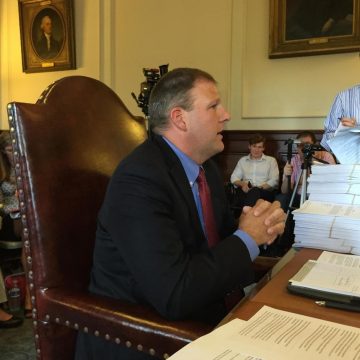
New Hampshire became the fifth U.S. state to legalize online lottery ticket sales today. Illinois, Georgia, Michigan, and Kentucky are the other states with legal online lotto sales.
New Hampshire Governor Chris Sununu signed H517, a House bill approving online sales through the New Hampshire Lottery last month. Charlie McIntyre, the executive director of the New Hampshire Lottery Commission, said he expects to sell online lottery tickets and scratch-offs in early 2018.
Why Online Lottery Sales Matter
Online lottery tickets are overlooked in the wider picture of online gambling, but they should not be. Every state which legalized online lottery tickets is another state likely to oppose Restore America’s Wire Act and other anti-online gambling bills in the US Congress.
Georgia Online Lottery Tickets
Georgia is a good example of the impact of Internet lottery gaming. Situated between a state with a fervent a notable online gambling opponents — South Carolina’s US Sen. Lindsey Graham — and a state so anti-gambling it does not even allow land-based lotto sales (Alabama), one might expect Georgia to be a big support of a federal online gambling ban.
Instead, Georgia has been one of the key states standing against Restore America’s Wire Act. Reinstituting UIGEA’s ban on online casinos and poker sites poses an indirect threat on Georgia’s online lottery sales, which would cost the state tens of millions of dollars each year.
The Online Gambling Industry in General
Thus, Gov. Sununu’s decision to legalize online lottery tickets in New Hampshire adds another ally to New Jersey, Delaware, and Nevada in their fight to maintain online gambling sites. Even if individual representatives and senators from New Hampshire took an independent stance on iGaming, the practice of selling lotto tickets online legitimizes and normalizes the practice in the state.
Charlie McIntyre said as much when he told the Union Leader, “For us, it’s just an evolution of how we do business. We’re not really selling anything new. We’re just doing it in a different way.”
Illinois Online Lottery Tickets
Illinois’s experience with online lottery sales have been positive. Given the state’s $15 billion budget shortfall, Illinois is a state which needs every revenue source it can find.
Illinois Lottery Director Michael Jones sounds like an official who would fight any move to ban iLottery sales.
Jones recently said, “The Lottery, through its private manager, launched the first Internet sales portal in the United States during the $656 million Mega Millions jackpot week of March 2012. Two years later, it is clear that the age and geography constraints that were key parts of the test are working as designed.”
Pennsylvania and Massachusetts Lotteries
Each new state which accepts online lottery gaming increases the chance that other states might legalize the practice. Already, Pennsylvania appears to be on the verge of legalize online lottery sales in its omnibus gambling bill, which is expected to pass into law sometime this fall.
Massachusetts lawmakers are discussing whether to legalize online lotto sales. Given its proximity to New Hampshire, the decision this week makes it more likely Massachusetts will follow suit.
West Virginia and Michigan Lotteries
West Virginia is another state which has discussed legalizing and regulating online lottery gaming. At a time, Minnesota legalized iLottery sales, but it was a temporary practice to help pay for U.S. Bank Stadium (where the Minnesota Vikings play). When the stadium initiative ended, online lottery sales were never re-upped by the Minnesota legislature.
Digital Gaming Group released a report in December 2016 which showed the positive impact of online lottery sales in Michigan, a state with a mixed record on Internet gaming. Digital Gaming’s report on the Michigan State Lottery said brick-and-mortar lotto sales show little correlation with online lotto sales.
DGG’s report stated, “The Michigan Lottery’s success story should be a page in the book of every lottery looking to convince its stakeholders of the value, certainty, and complementary nature of this new sales channel.”















